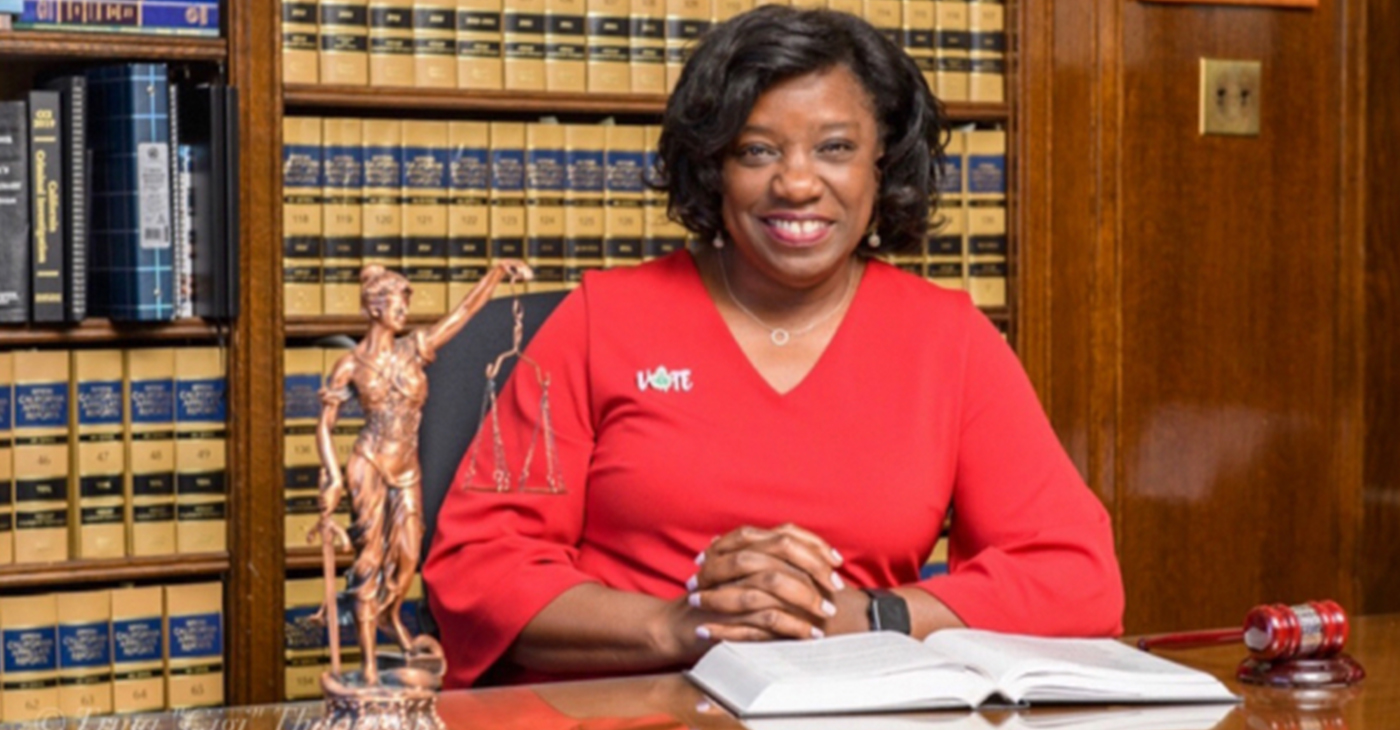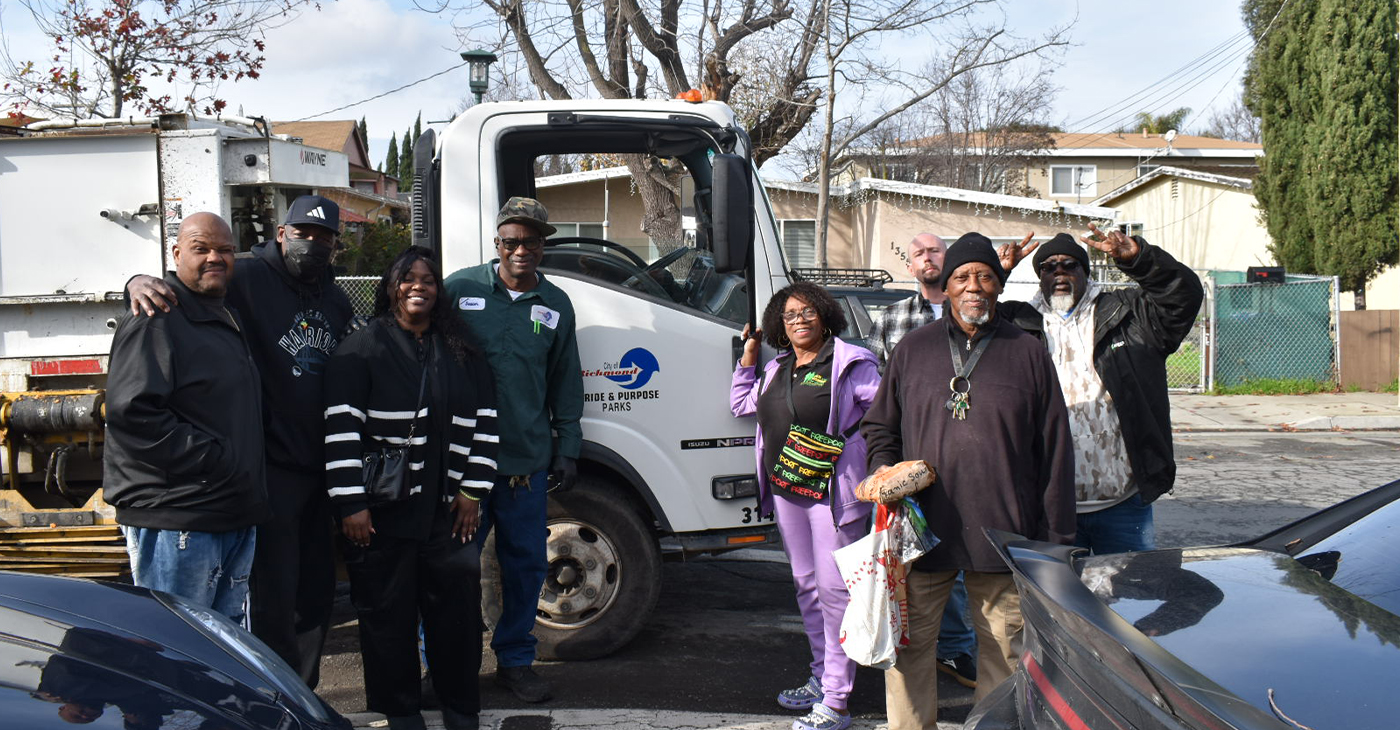Employment
U.S. Senate Confirms Trina L. Thompson As Judge for California’s Northern District
The Senate Judiciary Committee did not act on her nomination on the first session of the 117th Congress. President Biden nominated her again on Jan. 3, 2022. She had her nomination hearing on Feb. 16, 2022, and had her nomination was reported to the Senate Floor on March 10, 2022. Upon taking her oath, she will fill a judgeship vacant since Feb. 1, 2021, when District Judge Phyllis J. Hamilton assumed senior status. Judge Thompson will maintain chambers in San Francisco.

The United States Senate voted 51-44 on May 18 to confirm President Joseph R. Biden, Jr.’s, nomination of Superior Court Judge Trina L. Thompson to serve as a U.S. district judge for the U.S. District Court for the Northern District of California.
Thompson was first nominated for the judgeship on Nov. 3, 2021.
The Senate Judiciary Committee did not act on her nomination on the first session of the 117th Congress. President Biden nominated her again on Jan. 3, 2022. She had her nomination hearing on Feb. 16, 2022, and had her nomination was reported to the Senate Floor on March 10, 2022. Upon taking her oath, she will fill a judgeship vacant since Feb. 1, 2021, when District Judge Phyllis J. Hamilton assumed senior status. Judge Thompson will maintain chambers in San Francisco.
“All of us in the Northern District are grateful and excited to have Judge Thompson join us,” said Chief Judge Richard Seeborg of the U.S. District Court for the Northern District of California. “She brings a wealth of experience as a highly regarded trial judge which will be most welcome on our very busy Court,” Chief Judge Seeborg added.
Thompson has served as an Alameda County (California) Superior Court judge since January 2003 and was elected to the court in November 2002. Previously, she served as juvenile court commissioner from 2001 to 2002 and was chair of the Alameda County Educational Task Force for the juvenile court.
Prior to her appointment to the bench, she practiced law as a criminal defense attorney at her own law firm, The Law Offices of Trina Thompson-Stanley, in Oakland from 1991 to 2000.
Thompson served as an assistant public defender for the Alameda County Public Defender’s Office in Oakland from 1987 to 1991 and was a law clerk for the office in 1986. She also served as vice president of the Association of African American California Judicial Officers, Inc., (AAACJO) from 2019 to 2021.
Born in Oakland, Thompson received her Juris Doctor from the University of California, Berkeley, School of Law in 1986 and her A.B. from U.C. Berkeley in 1983. She has been an adjunct professor for U.C. Berkeley, School of Law’s Undergraduate Legal Studies Department since 2018 and was a lecturer at U.C. Berkeley’s Ethnic Studies Department from 2014 to 2021.
Thompson is a recipient of many awards, including The Raymond Pace Alexander Award, National Bar Association, in 2019; the Jurist of Distinction Award, Women Lawyers of Alameda County, in 2019 and 2011; Firefighter One Academy Community Service Recognition and Bay EMT Recognition Award, Merritt Community College, in 2017 and 2016; the Martin Luther King, Jr. “Living the Dream” Lifetime Achievement Award, Solano Community College, in 2016; the Pioneer Ward: A Trailblazer in the Field of Justice, The Oral Lee Brown Foundation, in 2013; Distinguished Judicial Service Award, Alameda County Bar Association, in 2009; Bernard Jefferson Judge of the Year Award, California Association of Black Judges, in 2004; and Judicial Leadership and Service Award for Exceptional Leadership and Service in Alameda County Criminal Justice, Alameda County Probation Department, in 2003.
The U.S. District Court for the Northern District of California had 10,289 new case filings in calendar year 2021. The court is authorized 14 judgeships and currently has three vacancies.
Appointed under Article III of the U.S. Constitution, federal district court judges are nominated by the president, confirmed by the Senate and serve lifetime appointments upon good behavior.
Story courtesy of the U.S. Courts for the Ninth Circuit.
Community
Richmond Nonprofit Helps Ex-Felons Get Back on Their Feet
For 20 years now, at a small center in North Richmond, Men and Women of Valor (MVOV) has been helping to rehabilitate ex-felons, giving them a second chance at life. Pam Saucer, the founder and CEO of MWOV, has long been a leader in the community, advocating for — and educating — at-risk youth and formerly incarcerated men and women.

By Magaly Muñoz
For 20 years now, at a small center in North Richmond, Men and Women of Valor (MVOV) has been helping to rehabilitate ex-felons, giving them a second chance at life.
Pam Saucer, the founder and CEO of MWOV, has long been a leader in the community, advocating for — and educating — at-risk youth and formerly incarcerated men and women.
The center offers these newly released ex-felons opportunities to get their GED, participate in community service projects, and obtain transitional housing while they get back on their feet.
“We’re giving back to the community and have had a positive impact. We go as far as cleaning up the area because you have to have a clean heart and a clean mind to want to do something productive,” Saucer said.
Take the case of Kiaira Fluker, 35, who had a probation violation in 2019 that caused her to spend 105 days in jail. After that experience, Fluker swore she’d do everything she could to never go back.
Fluker shared that she was referred to MWOV and, soon after, she learned about the rehabilitation program Saucer ran.
Fluker said the program provided her with job opportunities and life skills that have allowed her to stabilize herself and her three kids, who often visit the center as well. Being around the team at the center created a positive atmosphere for Fluker and made her realize that the people she was surrounding herself with in her past was not what she needed in her life anymore.
“I was blessed. If I hadn’t found Ms. Pamela, I would’ve lost everything from my housing and probably custody of my children,” Fluker said.
Although the center has been operating since 2005, Saucer’s work with disadvantaged youth and the formerly incarcerated has gone beyond the Richmond center. Many of the volunteers working there had known her for years before she took on the challenge of running her own organization.
Antayon Alexander, one of MWOV’s volunteers, shared that he has worked with Saucer since the ’90s and that she helped him develop the skills to run a transitional housing unit in Sonoma for two years.
Alexander had served three years in prison on a narcotics charge and has been on parole for over 30 years. He wasn’t proud of where he wound up at such a young age and did the work “day-in-and-day out” to not end up back in prison.
Alexander stressed to the men in the housing that this was their opportunity for a second chance at life and to better themselves, similar to his own experience after meeting Saucer. Alexander could relate to them on a level of understanding that transitioning out of incarceration was never easy work, but it was up to them to maintain clean and healthy paths in order to not recommit their crimes.
“We were all cut from the same cloth,” he said.
Alexander had spent a few years with Richmond Unified School District working with kids in group homes and running a special education school. He wants to work towards starting his own nonprofit, similar to MWOV, to continue giving back to the community in the way he knows best.
To ease the growing costs of gas and in some cases, not being able to obtain a drivers’ license because of prior convictions, MWOV is partnering with the city of Richmond to potentially build an e-bike rack outside of the center to make it more accessible for those in the area to get to doctors, appointments, job interviews, work or school. The program is called “Ride Today” and will feature five access points around Central Richmond with over 70 bikes.
Saucer says the e-bikes will be available at a low-cost or with a free membership for those involved with MWOV.
The center shows no signs of slowing down soon as they take on new projects regularly, including inviting aspiring musicians to use their onsite music studio, partnering with community members to provide vocational truck driving lessons, and hosting a celebrity fundraising competition with well-known Bay Area rapper, E-40, in March.
Business
G.O.P. Lawmakers: Repeal AB 5 and Resist Nationalization of “Disastrous” Contractor Law
Republican lawmakers gathered outside of the Employee Development Department in Sacramento on Jan. 23 to call for the repeal of AB5, the five-year old California law that reclassified gig workers and other independent contractors as W-2 employees under the state’s labor code.

By California Black Media
Republican lawmakers gathered outside of the Employee Development Department in Sacramento on Jan. 23 to call for the repeal of AB5, the five-year old California law that reclassified gig workers and other independent contractors as W-2 employees under the state’s labor code.
Organizers said they also held the rally to push back against current efforts in Washington to pass a similar federal law.
“We are here to talk about this very important issue – a battle we have fought for many years – to stop this disastrous AB 5 policy,” said Assembly Republican Leader James Gallagher (R-Yuba City).
Now, that threat has gone national as we have seen this new rule being pushed out of the Biden administration,” Gallagher continued.
On Jan. 10, the U.S. Department of Labor issued a new rule providing guidance on “on how to analyze who is an employee or independent contractor under the Fair Labor Standards Act (FLSA).”
“This final rule rescinds the Independent Contractor Status Under the Fair Labor Standards Act rule (2021 IC Rule), that was published on January 7, 2021, and replaces it with an analysis for determining employee or independent contractor status that is more consistent with the FLSA as interpreted by longstanding judicial precedent,” a Department of Labor statement reads.
U.S. Congressmember Kevin Kiley (R-CA-3), who is a former California Assemblymember, spoke at the rally.
“We are here today to warn against the nationalization of one of the worst laws that has ever been passed in California, which has devastated the livelihoods of folks in over 600 professions,” said Kiley, adding that the law has led to a 10.5% decline in self-employment in California.
Kiley blamed U.S Acting Secretary of Labor, July Su, who was the former secretary of the California Labor and Workforce Development Agency, for leading the effort to redefine “contract workers” at the federal level.
Kiley said two separate lawsuits have been filed against Su’s Rule – its constitutionality and the way it was enacted, respectively. He said he is also working on legislation in Congress that puts restrictions on the creation and implementation of executive branch decisions like Su’s.
Assemblymember Kate Sanchez (R-Rancho Santa Margarita) announced that she plans to introduce legislation to repeal AB 5 during the current legislative session.
“So many working moms like myself, who are also raising kids, managing households, were devastated by the effects of AB 5 because they lost access to hundreds of flexible professions,” Sanchez continued. “I’ve been told by many of these women that they have lost their livelihoods as bookkeepers, artists, family caregivers, designers, and hairstylists because of this destructive law.”
Activism
PRESS ROOM: Oakland Pic Hosts New Year’s Career & Resource Expo
OPIC CEO Pastor Raymond Lankford expressed his enthusiasm for the event, stating: “This Career Fair is not merely a gathering of employers and prospective employees; it’s a platform for opportunity, growth, and community collaboration. We are thrilled to bridge the gap between Oakland’s talented residents and the employers who recognize their potential. Together, we are building a stronger Oakland.”

Connecting Employers and Talent in Oakland and Beyond
OAKLAND, CA – Oakland Private Industry Council, Inc., is hosting the New Year’s Career & resource Expo on Thursday, February 8, 2024, at 12 noon at the Oakland Coliseum – Eastside Club – 7000 Coliseum Way, Oakland CA 94621.
This exciting event brings together over 70 employers, all seeking to hire Oakland residents with various skill levels to fill a wide range of employment opportunities. Additionally, a collaborative of resource agencies will be in attendance, providing further assistance to job seekers.
OPIC CEO Pastor Raymond Lankford expressed his enthusiasm for the event, stating: “This Career Fair is not merely a gathering of employers and prospective employees; it’s a platform for opportunity, growth, and community collaboration. We are thrilled to bridge the gap between Oakland’s talented residents and the employers who recognize their potential. Together, we are building a stronger Oakland.”
For more information or to request media access, please contact Yawo Tekpa at yawot@oaklandpic.org.
OAKLAND PIC HOSTS NEW YEAR’S CAREER & RESOURCE EXPO
- Who: All job seekers, with all ages and experiences welcome
- What: Connecting Employers and Talent in the Community
- When: Thursday, February 8, 2024 at 12 noon
- Where: Oakland Coliseum – Eastside Club – 7000 Coliseum Way, Oakland CA 94621.
OPIC INVITES YOUR ORGANIZATION TO PARTICIPATE IN OUR UPCOMING NEW YEAR’S CAREER & RESOURCE EXPO!!!
Dear Esteemed Employer & Community Organization Partner,
Oakland Private Industry Council, Inc. (OPIC) is excited to wish you a warm welcome into 2024! A new year, a new HOPE!!!
We enthusiastically invite your organization to participate in our NEW YEAR CAREER & RESOURCE EXPO at the OAKLAND COLISEUM!!!
DATE: THURSDAY, FEBRUARY 8, 2024
TIME: 12:00 NOON – 3:00 P.M.
LOCATION: OAKLAND COLISEUM – EAST SIDE CLUB
ADDRESS: 7000 COLISEUM WAY, OAKLAND CA 94621
Participating Employer & and Community Resource Partners will receive one six-foot table and two (2) chairs for this event. Additional information, including event details and logistics, will be forwarded after you sign-up.
Please confirm your attendance by completing the online registration link below by JANUARY 31, 2024 at the latest.
https://docs.google.com/forms/d/1bfv0LXBexc26AeE_cosSoQrpYrx2HXOIwn1bG47chwU/edit
Thanks to our invaluable network and partnership, we are giving HOPE to many community members through quality employment opportunities and supportive resources.
If you have questions, don’t hesitate to contact Yawo Tekpa, Assistant One-Stop Operator/Events Coordinator, at (510) 419-0392 office/ (510) 499-6657 cell.
Sincerely,

Raymond Lankford Yawo S. Tekpa,
CEO Assistant One-Stop Operator/Events Coordinator
-

 Activism4 weeks ago
Activism4 weeks agoOakland Post: Week of March 27 – April 2, 2024
-

 #NNPA BlackPress4 weeks ago
#NNPA BlackPress4 weeks agoCOMMENTARY: D.C. Crime Bill Fails to Address Root Causes of Violence and Incarceration
-

 #NNPA BlackPress4 weeks ago
#NNPA BlackPress4 weeks agoMayor, City Council President React to May 31 Closing of Birmingham-Southern College
-

 #NNPA BlackPress4 weeks ago
#NNPA BlackPress4 weeks agoBeloved Actor and Activist Louis Cameron Gossett Jr. Dies at 87
-

 Community1 week ago
Community1 week agoFinancial Assistance Bill for Descendants of Enslaved Persons to Help Them Purchase, Own, or Maintain a Home
-

 Activism3 weeks ago
Activism3 weeks agoOakland Post: Week of April 3 – 6, 2024
-

 Business1 week ago
Business1 week agoV.P. Kamala Harris: Americans With Criminal Records Will Soon Be Eligible for SBA Loans
-

 Activism2 weeks ago
Activism2 weeks agoOakland Post: Week of April 10 – 16, 2024























































